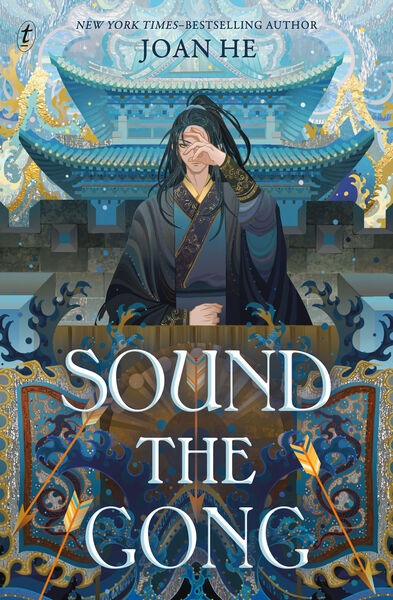If The Fates Allow
Sound the Gong (The Kingdom of Three, volume 2)
By Joan He

13 Dec, 2024
2024’s Sound the Gong is the second and final volume of Joan He’s The Kingdom of Three duology.
Although the empress still lives, her empire has long been divided into three principal regions under three warlords. Cicada holds the south, Xin Ren clings to the west, and Miasma holds the rest. Miasma is also in control of the person of Empress Xin Bao. Miasma can be described as the empress’s regent (if one is polite) or jailor (if one is not).
Observers might credit Miasma with the strongest position and Xin Ren with the weakest… if not for the fact Xin Ren has as her strategist the brilliant Zephyr. With Zephyr guiding her, surely Xin Ren can triumph, taking the empire and throne for herself.
There are a few minor problems with this otherwise perfect plan. The most obvious is that Zephyr died in the previous book.
To Zephyr’s great surprise, death was not the inconvenience she expected. Her soul was not recycled and sent on its way. This is because she is a god wearing a mortal shell. Zephyr’s body was not salvageable, but the god was able to move from her previous body to that of the ferocious warrior Lotus.
Zephyr-in-Lotus lacks the warrior’s superlative combat skills, but retains every bit of the god’s genius. Therefore, she should be able to provide Xin Ren with the guidance needed to outwit Cicada and Miasma. In time, Xin Ren will surely defeat her foes, dethrone powerless Xin Bao, and bring peace back to the empire.
Or she would, if Xin Ren did not take her oath to the empress very seriously. Xin Ren has no desire to depose the rightful empress or to take her place. Her goal is to rescue the empress from her cruel regent Miasma and by so doing, restore order to the world.
There is also the minor matter that Xin Ren’s rivals employ their own strategists. Miasma has Crow, and Cicada has November. Zephyr might be a god hiding in a borrowed mortal form, but she can and has been outwitted or surprised by unforeseen circumstances.
The most important impediment does not involve any mortal. Zephyr’s fellow gods, most especially the Masked Mother who is effectively the senior-most god, insist that mortal fates be fixed. It does not matter how brilliantly Zephyr advises Xin Ren, because fate has decreed neither Xin Ren, Cicada, nor Xin Ren will ultimately triumph. Instead, comparative non-entity Plum will step in after the three rivals perish.
Can fate be changed? And if it can, what will be the cost?
~oOo~
Author He is drawing on the Romance of the Three Kingdoms, so it’s best not to go into this series expecting that it will conform to Western ideas about what constitutes a proper heroic narrative. Readers sufficiently intrigued to seek out the source material will find it conforms even less closely to Western conventions, not least because as a historical tale, Three Kingdoms is constrained by history.
Perhaps I should have mentioned earlier that Miasma’s greatest asset may be that she considers rules as something other people follow. Miasma herself obeys no law or convention if it inconveniences her. Of course, in real life, that sort of behavior would result in immediate consequences the second that Miasma came into contact with a guard rail. This is a fantasy novel where villains go unchecked… at least for a while.
People frustrated with government by mendacious knuckleheads might dream of government by terribly smart people. While the argument for a centralized, unitary government is compelling, the case in favor of government by wise counsellor is less persuasive. The problem appears to be that there are too many wise counsellors who disagree vociferously. The solution is obvious: kill all but one of them and listen to the survivor. Implementation of this perfect system will face at least one issue, if this novel is a guide: new brilliant strategists appear to spring up like dandelions after rain.
While reading this novel, I found myself wondering: why is human fate fixed? Does Fate serve any purpose? or is it just a meaningless phenomenon? Now in one passage the Masked Mother instructs the other gods that “mortal affairs are not to be meddled with.” But… if human fate is fixed, then “mortal affairs cannot be meddled with.” The gods should be incapable of harming or helping mortals in any significant way. But what about Zephyr?
First: let me praise He for delivering the series promised, in the number of volumes promised, in the time frame promised. People complain when authors do not accomplish that, so success should be praised1.
Second: despite my philosophical concerns about fate and whether it makes every story completely meaningless, He manages to keep me interested in the characters and what happens to them. He is faithful to the source material without feeling the need to deliver a story that maps one to one on the original2. The skillfully-told narrative moves along at a nice pace.
Sound the Gong is available here (Amazon US), here (Amazon Canada), here (Amazon UK), here (Apple Books), here (Barnes & Noble), here (Chapters-Indigo), and here (Words Worth Books).
1: Unless fate is fixed, in which case it seems rude to rebuke authors for failing at something ordained to be unsuccessful. Although as our rebuke would also have been fated, the injustice of it all is not our fault.
2: I too am reminded of how Tanith Lee’s Sung In Shadow treats Romeo and Juliet. Well, unless for some reason you weren’t, in which case you should have been.
